-
BAND-HISTORY
-
POSTERS + FOTOS
-
MORE INFOS
1975
During the Germany tour in March 1975 the band were again "celebrated enthusiastically with their hard and loud heavy rock" (BRAVO). In the summer of 1975 the quartet very successfully toured Spain for two months (30 gigs!). The great attention which the band received there (22.000 audience members in San Sebastian alone) lead CBS to release another single from the LP “Hoodoo Man” onto the market. "Gamma Ray Part 1+2" was first released in Spain. The cover shows the line up of 1975 live on stage, while the German version was published in the style of the "Plastic People" LP. A third version of the single was released in Portugal.
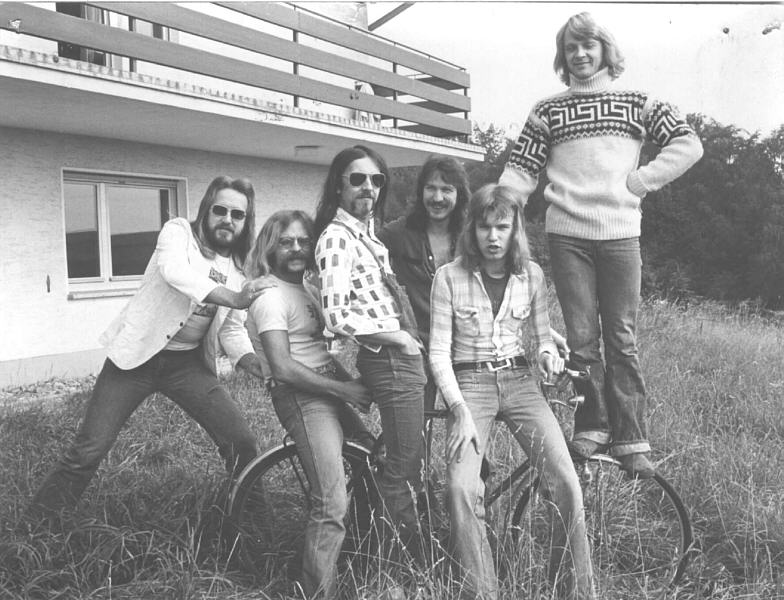 |
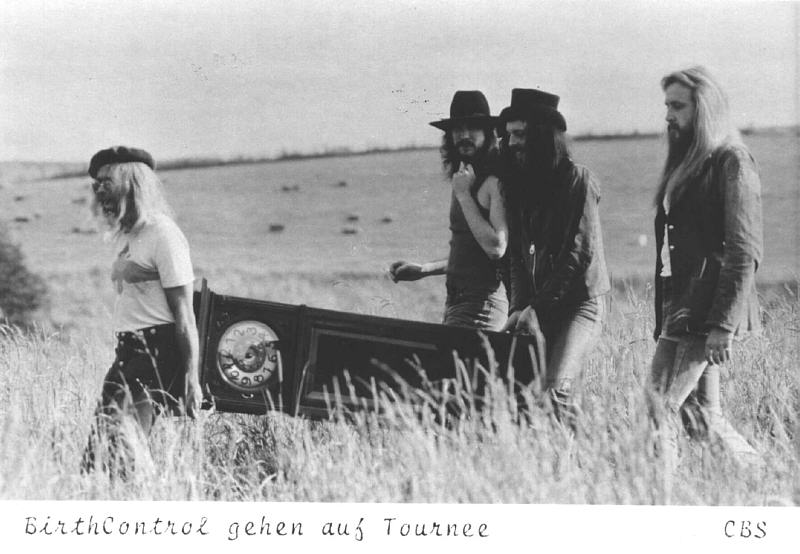 |
 |
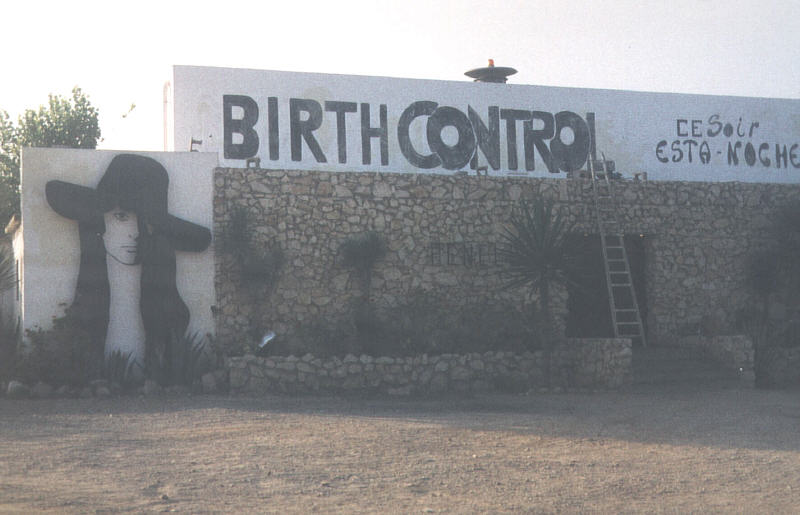 |
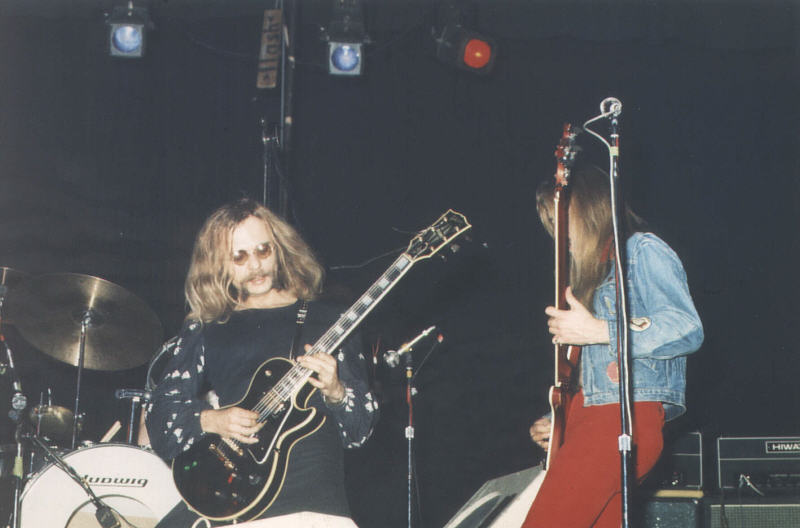 |
During the Germany tour in autumn they introduced their new album "Plastic People", in which they tried to progress from well-known heavy rock riffs to more demanding (and complicated) sound collages, but got lost in different concepts. The title "Trial Trip" became a classic of this album and in its present-day version with Peter Engelhardt on guitar it is one of the highlights of each concert. In November 1975 they played gigs in four English towns as support act for Blue Öyster Cult. The readers of the German music magazine MUSIKMARKT voted Birth Control the third best German band after Silver Convention and Kraftwerk.
In September 1975 a group of 23 youngsters visited Birth Control in their residence in Pohlhausen. This event was organised by the youth magazine "POP". The group handed over the 'Silver POP-Hammer' award for being voted the second best band of the year. BC thanked the group with a free concert in the practice room in the cellar of their house. (Comment of the Webmaster: I'd love to know who took part…)
After completion of the Plastic People album the contract with CBS expired. BC went back to the Metronome label and made a contract for four LPs on the (green) BRAIN label.
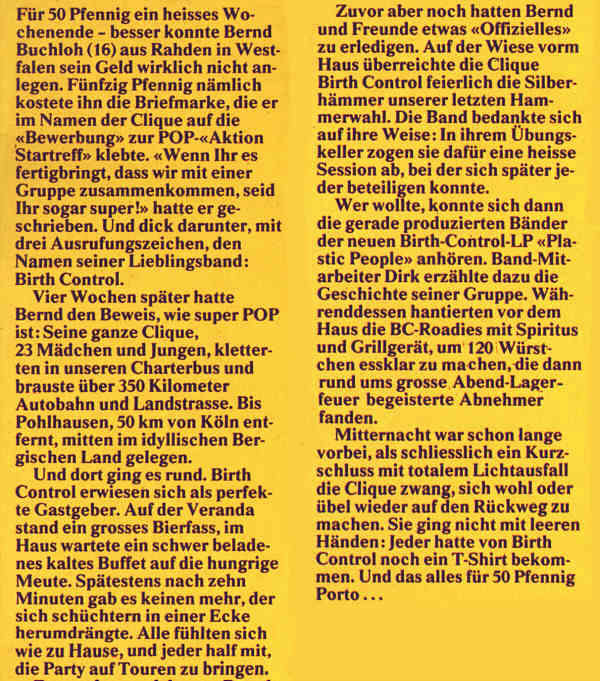 |
 |
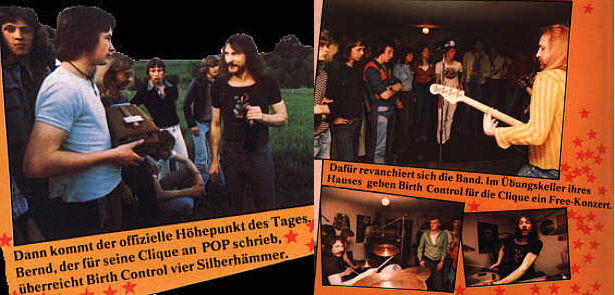 |
 |
1976
On their tour in autumn 1976 Birth Control presented a completely new rock concept which confused their fans and became manifest on their album "Backdoor Possibilities". With complicated rock structures and occasional jazz and classical tendencies, they narrate a muddled-up story of a "typical, clichéd white collar worker who is empty minded and organises his life along certain rules and regulations, until one day he is confronted with death in a rather abstract way" (Held). "This production", according to the ROLLING STONE magazine, "is below their standards and limits itself to imitations of idols such as Genesis, King Crimson and Yes". Here the influences of a constantly changing line-up are becoming evident. Even though "Backdoor Possibilities" was probably the most complicated and painstaking work of the band, the style was not well-received by the fans and the crowds were getting smaller.
The tour then ended early when Nossi fell from the stage in Wettingen (CH) and injured his right arm on a broken beer bottle that was lying on the floor.
 |
 |
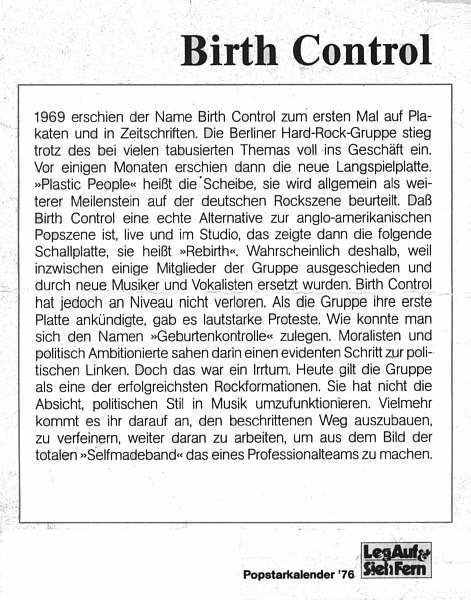 |
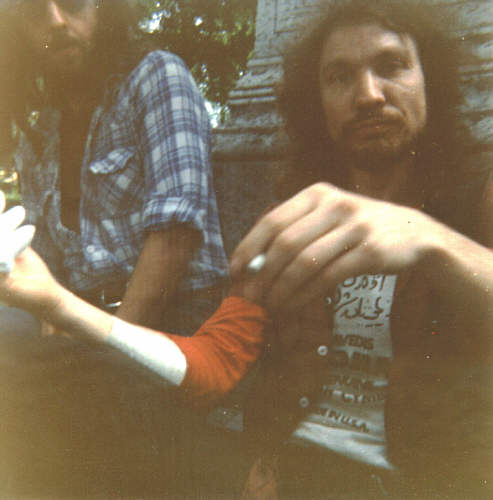 |
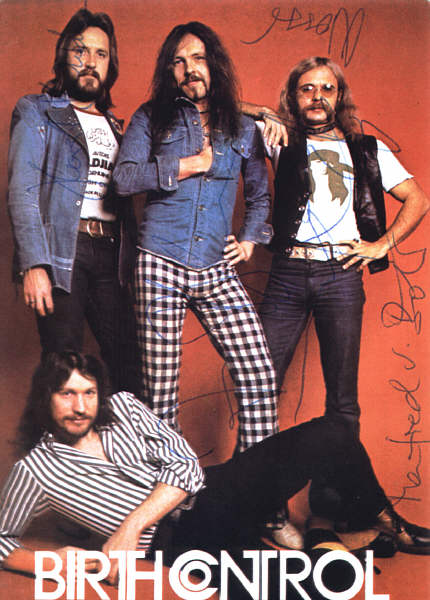 |
 |
1977
In early 1977 the 9th single "Fall Down / Love Or Cry" was released – two titles which once again had not been on any of the LPs. The CD "Backdoor Possibilities" which had been released by Repertoire Records in 1997 contains these titles as bonus tracks.
After the line-up had remained the same for four years, there was another change for BIRTH CONTROL: bassist/singer Peter Föller left the band for musical reasons. Ex-Message member Horst Stachelhaus from Stuttgart took his place. He was regarded one of the best and most wanted bass players in Germany. In May Manfred von Bohr, the drummer of Message and a master of his trade, joined, too. This way a new phase also began for Nossi: front singer! But he couldn't do without drums altogether. From then on, there was always a lot of percussion performed on stage.
During the last five concerts of the spring tour in 1977, Horst Stachelhaus was on stage as well. The title "Meta Ventilator" was only ever performed live during the last three gigs of this tour but it was never released. On 1st May, during a gig in Korbach town hall, the band members themselves recorded the title on audio tape. Original announcement by Nossi: "We are now playing a completely new song. Yesterday it fell flat on its face but perhaps you are luckier today."
Ecki's memories:
On 28.02.1998 Horst Stachelhaus gave me this tape in Sendenhorst. I restored it as much as possible. This was my first audio work! After Jörg Becker had provided the recordings of Bad Zwischenahn and Nettetal (1983), the idea of a live sampler was born. In 2000 I released the CD "Live Abortion – rare and unreleased tapes from the past" as a fan club edition. Meta Ventilator was rated very highly by the fans!
The album "Increase", which the band took along on their poorly attended Germany tour in autumn, shows similarity to its LP predecessor but is more rhythmic and rounder than "Backdoor Possibilities". Yet, the classic rock elements which made Birth Control so popular were still lacking. On the last but one night of the Increase-Tour the car of the roadies was involved in a road accident near the town of Lüneburg. This was an opportunity for the band members to re-consider their situation and to allow themselves a break after 12 months of continuous travel.
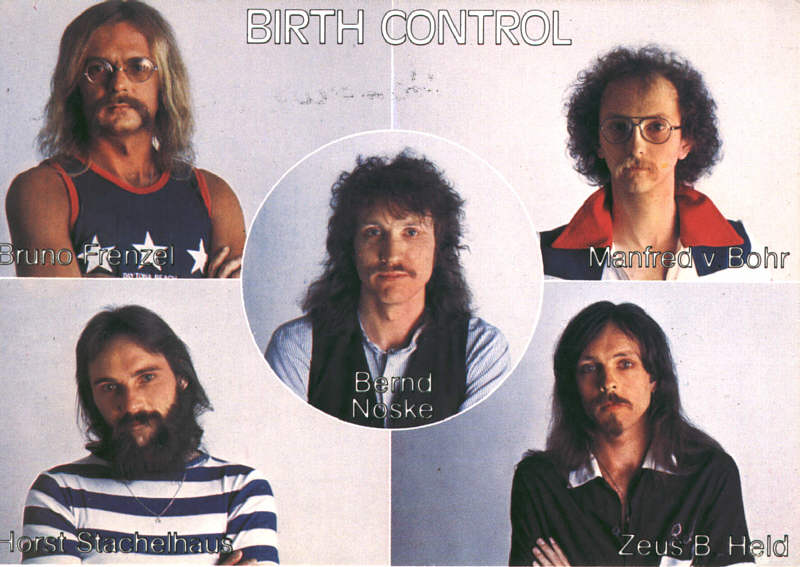 |
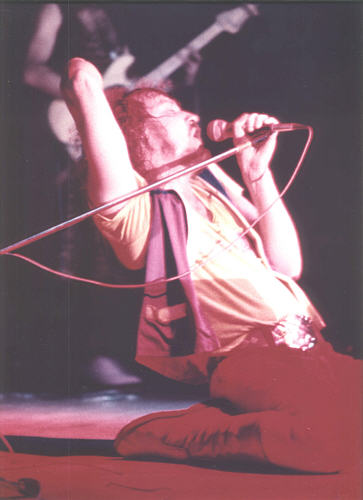 |
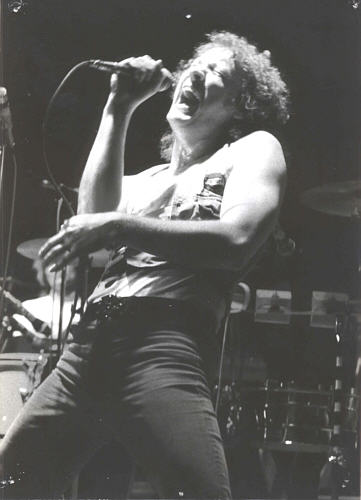 |
 |
1978
Birth Control only gave one concert at the Brain-Festival in Essen.
Bernd Noske utilised this time to work on a solo project. For almost one year he dedicated his time to studio work and recorded the album "Come Out At Night". The titles, which were composed by him and for which he wrote the lyrics, describe his impressions and experiences during the Spain tour in 1975. During this work Nossi was supported by Bruno Frenzel on bass but all the other instruments were played by himself!
 |
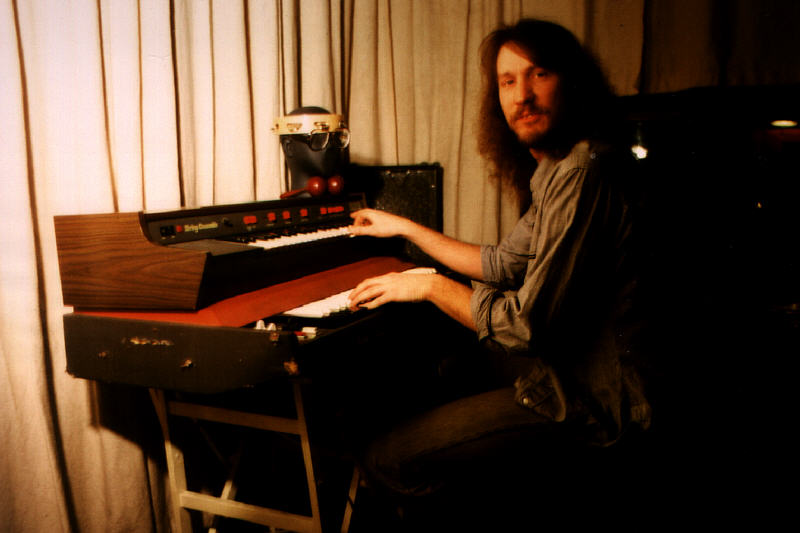 |
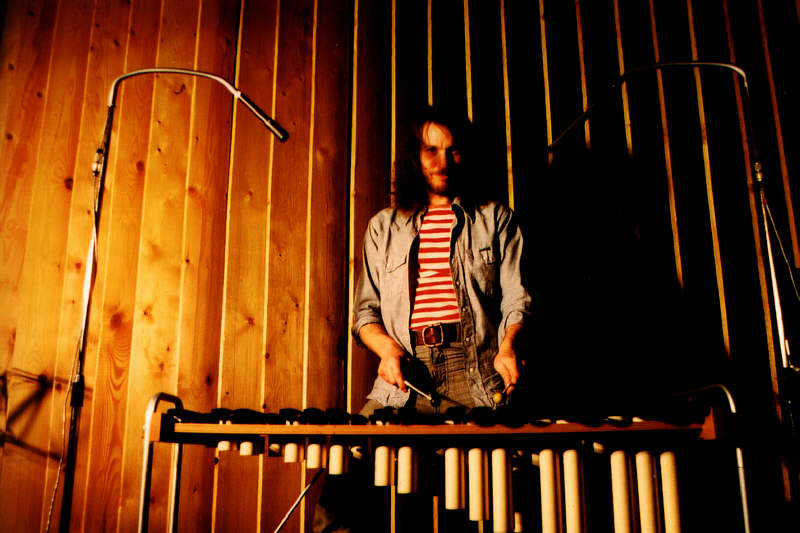 |
 |
 |
This fantastic album did not sell at the time. On the one hand, the record contract with Metrononome expired in 1979, and on the other the record company believed that the Spanish style of the album did not fit in with the commercial trend. It was mothballed and a second production, which Nossi had already started, was abandoned. 20 years later Nossi gave me the DAT tape with the words "Just listen to this!" – and the wallbreaker acted on it ;-)
Ecki's memories:
There was that tape in 1998; I thought Birth Control – unreleased – and then suddenly I heard Spanish music – but absolutely brilliant! I phoned Nossi: "Hey, we’ll have to release this!" Reply: "Yeah, go ahead with it, but it still needs re-mastering. There were transitions between the songs – noises of wind and water – which are not audible on the tape. Have a word with the technician." I phoned the technician. He said something like "no problem" and mentioned "emphasis" (whatever that may be)! I didn’t know what he was talking about but I said YES! Then I put my headphones on, fiddled around with the PC, tried out all sorts of dials and filters – and eventually the wind noises were audible again. Yeah, sorted! It’s well known that you learn by doing.
The album "Titanic" which was produced in the summer, documented the return to classic rock rhythms of the early 70s with "good time heavies for head-bangers and knee-wobblers" (NEW MUSICAL EXPRESS). Then keyboarder Zeus B. Held left. He has since been working successfully as a producer.
1979
With their new keyboarder Wolfgang "Vox" Horn Birth Control had a TV appearance on 24.3.79 on the programme "Sparring". During the May tour, a concert at the Niederrheinhalle in Wesel (19.5.79) was recorded (as part of a deal with the record company) and edited for the LP documentation "Live '79". It became apparent (as with the earlier 1974 live LP) that the band only fulfil their true potential when they’re on stage, due to their enthusiasm, vitality and charisma.
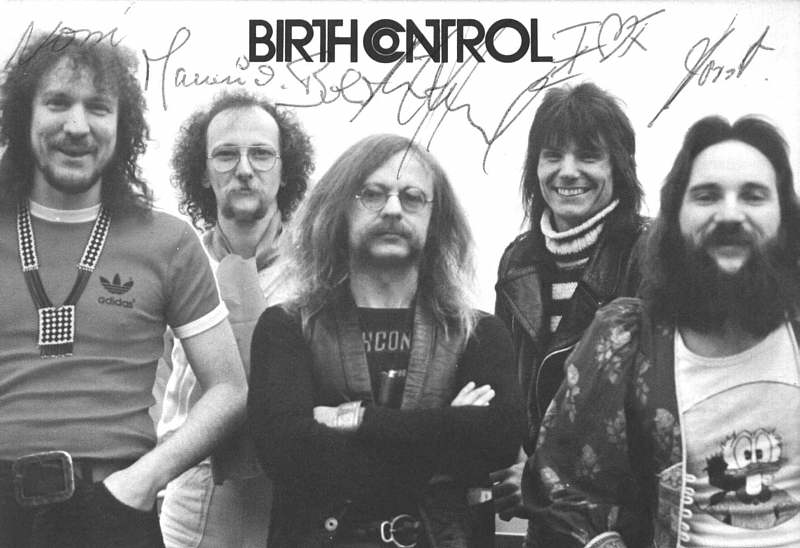 |
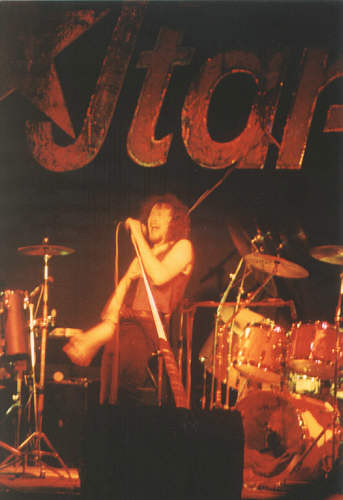 |
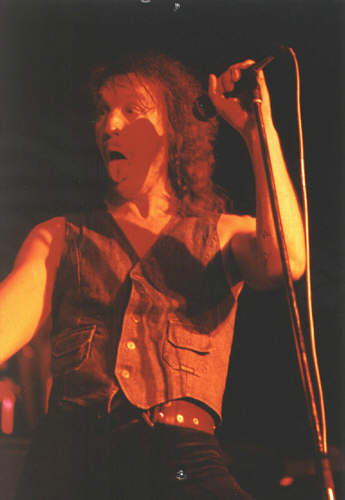 |
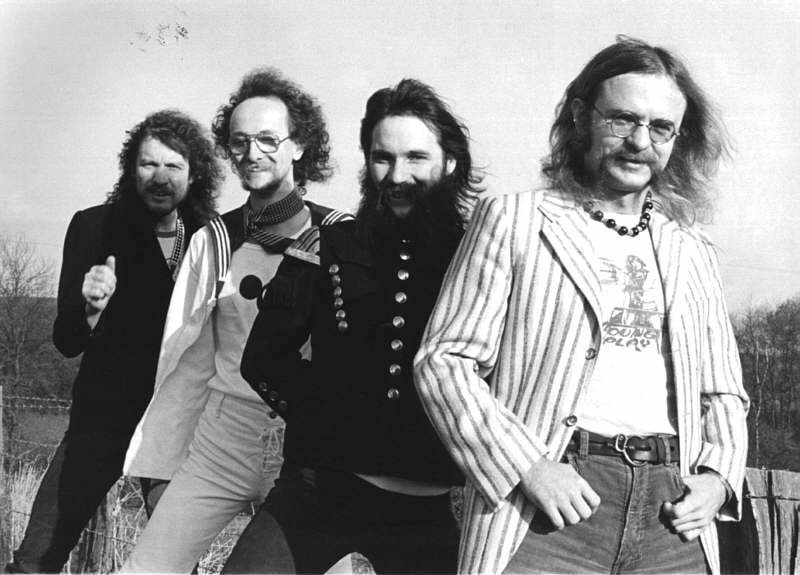 |
 |
October 1979 is seen as a new beginning for Birth Control. A record deal with Ariola and a new music publisher (Zorro Music Köln since July 1978) were important for this. Also the two masterminds of the band – Nossi and Bruno – returned to the old values of the band, that is, to the strongly rhythmic components of their rousing rock. On "Count On Dracula", which was recorded at the end of 1979 and released in February 1980, the first signs of this development became apparent. It rocked again! In November 1979 the company B. Koczy Promotion took over the tour organisation of Birth Control.
1980
In 1970 the debut album of the band BIRTH CONTROL had been released. The year of their 10th anniversary saw numerous activities which emphasised the top position of BC in the German rock scene. The band recorded a new LP in November 1979 called "Count on Dracula", which was released as their first production with ARIOLA on 28.1.1980. Bernd Noske, singer and songwriter, who together with Bruno Frenzel formed the musical brain of the band, comments: "The LP "Count on Dracula" ties in with "Hoodoo Man", but at the same time we consider it a completely new beginning".
After ten years of late experimenting, the masterminds of Birth Control, Bernd 'Nossi' Noske and Bruno Frenzel, returned to the strongly rhythmic components of their early phase („Operation“, „Hoodoo Man”) and to their stylish rousing rock in order to combine it with the musical experiences and influences which they had gained in the first ten years of their existence. If Bruno and Nossi saw themselves as the masterminds at that time, it meant that they'd fully regained the responsibility for Birth Control, musically and financially. Remember: many cooks spoil the broth.
The fact that Birth Control had not been at their best at some stages of their career was not down to a lack of ideas or strength on the side of the band members. A phase of reflection had become important to root out the wrongly interpreted idea of democracy, the old hippie ideology so to speak, and to build healthy foundations for a small musical enterprise which was in line with the time. "It had become too chaotic, all members composed and wrote lyrics at the expense of a clear concept, which had a dramatic effect on record sales", Bruno remembers. While "Hoodoo Man" sold 100.000 copies, all of a sudden we had to put up with less than a tenth of that. While previously, journalists couldn't write enough about us and radio stations constantly played our songs, there was a sudden silence in the media. "Some people thought we didn't exist any more", says Nossi. But despite all difficulties in the last decade, none of the Birth Control members look back in anger. The history of Birth Control goes back to 1968. Everywhere there were student revolts, rebellion and protest. That was everyday life in the late sixties and right in the middle of all this Birth Control appeared with a band name that provoked: BC's protest against the Encyclical Humanae Vitae of Pope Paul VI. The use of a concept which worked for Birth Control at that time, was to become a popular marketing strategy in the rock industry in later years. Without getting tangled up in great strategic plans, the band had created their own image as a matter of course – record covers, lyrics, graphics, posters – everything fitted together. It was taylor-made for them. The pioneering spirit of 69 which doesn't exist any more today.
While "Hoodoo Man" reached highest sales figures almost without anyone noticing, the band themselves were not quite so convinced of their type of hard rock. They became too side-tracked by different trends that had influenced them and on top of that there were company-internal efforts to make the band sound more like pop music. "Rebirth", which had been recorded during this time of disorientation, subsequently sold poorly - not to say very poorly. The live LP sold better, and Birth Control's uncertainty finally resulted in the thought: "Hoodoo Man" wasn't right, „Rebirth“ even less so, so we'll finally do what we really want to do, regardless of losses or sales figures.
"Plastic People" and "Backdoor Posibilities" were released, music for minorities, for intellectually minded listeners, with crazy melodies and rhythms. In the meantime the profit figures for "Hoodoo Man" were issued bit by bit and they added them up. "That's as many as 100.000 sold LPs" the band realised in amazement. Doubts arose as to whether the decisions to change the musical direction hadn't been a huge error. "Increase" was then a first step back to easier digestibility, "Titanic" was the beginning of a new phase.
Victim of this new development and the new structures of Birth Control was keyboarder and electronics nerd Bernd 'Zeus' Held, who preferred to go his own way rather than submitting himself to the team of house composers Frenzel / Noske, which would have been in favour of a uniform style and a consistent mood. "Neither truly-German nor Anglo-American plagiarism" - this is how Bruno expressed their goal, which was not particularly new in Germany but which had only been achieved in very few cases. Yet Birth Control had enough energy for defining such time consuming and painstaking desires, as well as searching for their own musical expression. (Quelle: Ariola) You can't express it any better!
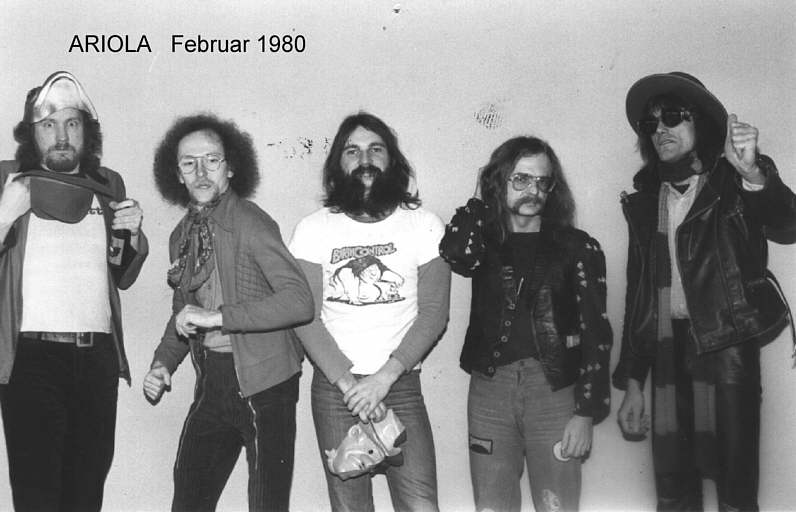 |
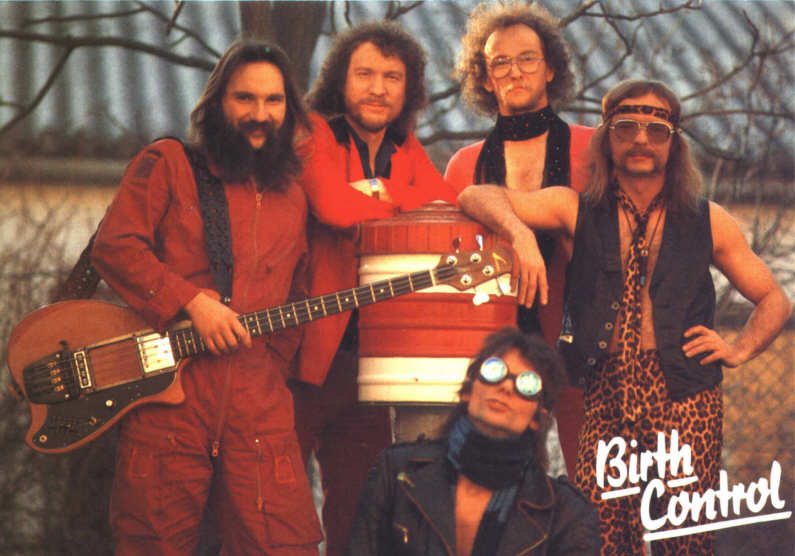 |
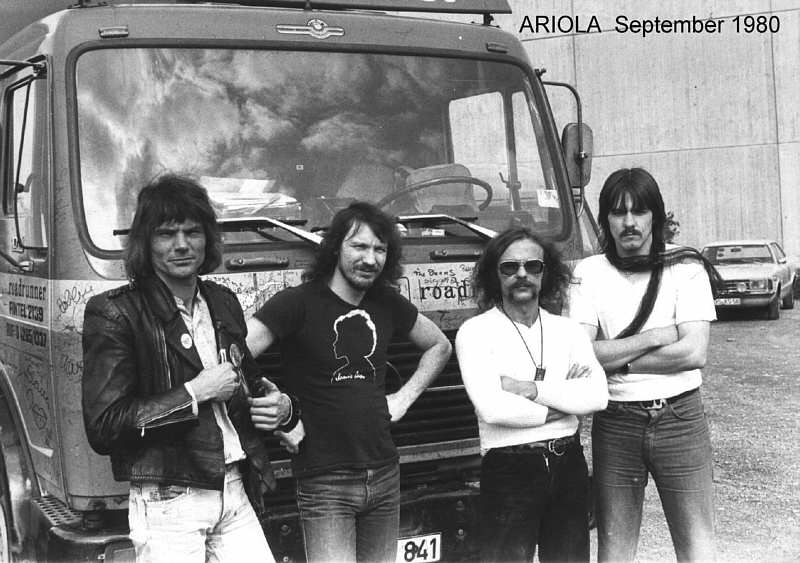 |
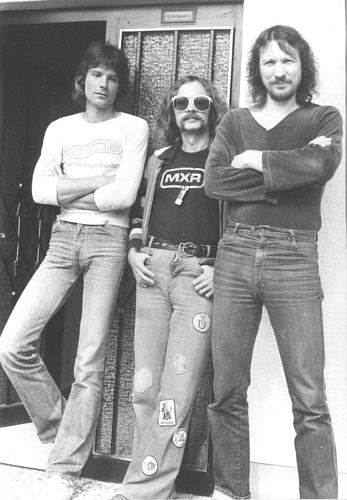 |
 |
"Count On Dracula", the first BC LP released with Ariola in February 1980, documented the return to classic rock. "Witchhunters" and "The Rescue" are examples of this. In March 1980 BIRTH CONTROL went on tour again. The response of the audience was excellent – many sold-out halls; encores everywhere. There was a demand to see the band live again. At the end of April 1980, an appendix brought great turmoil and changes to the line-up that nobody could have foreseen: Manni von Bohr, who had played the drums, had to be taken to hospital with an acute appendicitis. The upcoming May tour threatened to be cancelled. Bernd Noske, who in the mid-70s had been regarded as one of the best drummers and who in the past few years had only been "the voice" of BIRTH CONTROL, decided to take a seat behind the drumkit again, in addition to being the lead singer. The great success proved them right because Nossi's drum solo was again the absolute highlight of every live concert and the attraction for which the audience were waiting and which they talked about.
Also Horst Stachelhaus left Birth Control after the spring tour in 1980. In September 1980 they found a new bassist with Jürgen Goldschmidt who from then on provided the rocking rhythms. The recordings for the LP "Deal Done At Night" were completed in autumn 1980 with the following line-up: Bernd "Nossi" Noske – vocals, drums, percussion; Bruno Frenzel - guitar, vocals; Wolfgang "Vox" Horn – key instruments, vocals; Jürgen Goldschmidt - bass, vocals.
The selection of the individual songs for the LP were based on a new strategy: The titles on the LP had already been tested during live concerts in September/October 1980 and were found to be well-received by the audience. Rousing rock of the highest class, sparkling and wild, as well as new, unique choral singing marked the songs "Burnt Gas", "He’s In The Right", "Don’t Call Me Up" or "Deal Done At Night" to mention just a few titles of the current LP. And in order to perform them on stage even better, Stefan Linke was taken on as second guitarist at the end of the year. (Excerpt from an informational text from the press department of ARIOLA)
1981
In spring 1981 the band went on tour, featuring their new LP "Deal Done At Night". Then the management changed once again: Intermusic Harald Meurer took over for the LP "Bäng".
The list of successes during Birth Control’s career demonstrates why the band, which was founded as early as 1968 in Berlin, still capture much attention despite the rapid development of rock music. To mention some milestones of their career: an extensive tour through the Middle East, a gig at the legendary Beat-Club, several European tours, the first German band play the major British rock venues "Marquee Club", "Lyceum" and "Speak Easy", a concert in Cannes at the MIDEM in front of 12.000 specialists from all over the world, 2nd and 3rd places among the most popular German bands for several years, first places for the band members in the section "Instruments", 100.000 sold copies of "Hoodoo Man" with their big hit "Gamma Ray", Germany’s live band no.1, a tour concert at the Parisian "Palais des Sport" in front of an audience of 9.000, a tour through Spain for over several months (22.000 visitors in San Sebastian alone), numerous films and music recordings in Germany and abroad, cooperation with star producer David Hitchcock, who had already produced bands such as Genesis, Camel and Caravan, numerous Germany tours, production of 12 LPs in 13 years.
The British rock-magazine “New Musical Express” described Birth Control as one of the leading European bands. The only remaining members of the original line-up are the “men of action” Bruno Frenzel and Bernd Noske. They were joined by new members Jürgen Goldschmidt (bass/vocals), Stefan Linke (guitar/vocals) and Uli Klein (keyboard/vocals). This new rejuvenation and enhancement of the band gives Birth Control the opportunity to put the sophisticated and powerful compositions of the team Frenzel/Noske into practice. This becomes apparent not only during live performances, where Birth Control after 13 years of stage experience still know how to get their audience going, but also through their LP – the 13th! - which is due in autumn this year and which was produced in one of Germany’s best studios (Dieter Dierks) and with one of the best sound technicians (Jürgen Krämer) who was responsible for the sound of Rory Gallagher’s LPs among others. The band recorded this production live in a studio, which requires more than the usual degree of commitment and experience from the band members. (Promotion of the company INTERMUSIC for the LP "BÄNG")
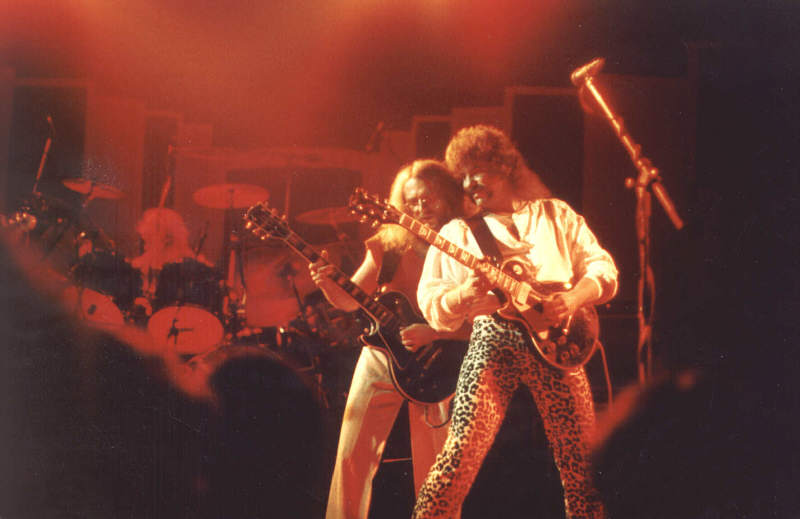 |
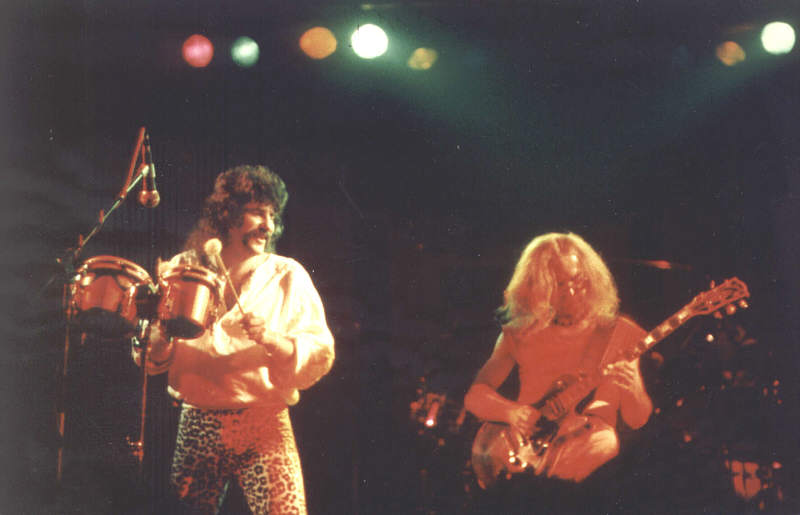 |
 |
 |
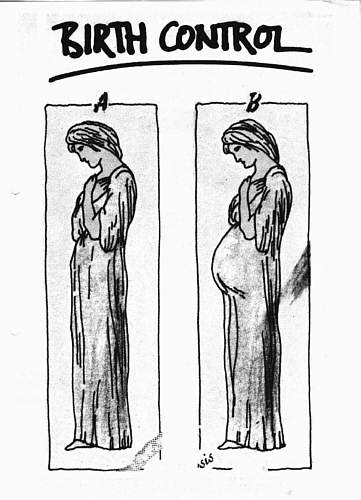 |
1982
The quintet Bernd Noske (vocals, drums), Bruno Frenzel (guitar, vocals), Ulrich Klein (keyboards), Jürgen Goldschmidt (guitar) and Stefan Linke (guitar) recorded the LP "BÄNG" in spring 1982. None of the people involved had a notion that for the time being this would be the last work of the legendary band. After years of progressive preferences, which had their effect on "Backdoor Possibilities" and "Increase", the band had re-discovered their passion for transparent rock music. The return to catchy, direct arrangements had no commercial reasons, though. Birth Control had always remained faithful to their own musical styles, never adapted themselves to current fashions and didn’t do this either when the 'Neue Deutsche Welle' (New German Wave) rushed in. As was typical of main composer Frenzel, many lyrics of this album contain demanding, at times even apocalyptic topics, which unmistakably represented the gloomy visions of the guitarist. Particularly notable is also the cheeky-ironical front cover of the album with an atomic explosion under Marilyn Monroe’s skirt, as well as the art works on the back which visually emphasise the predominantly apocalyptical moods of the Frenzel-lyrics.
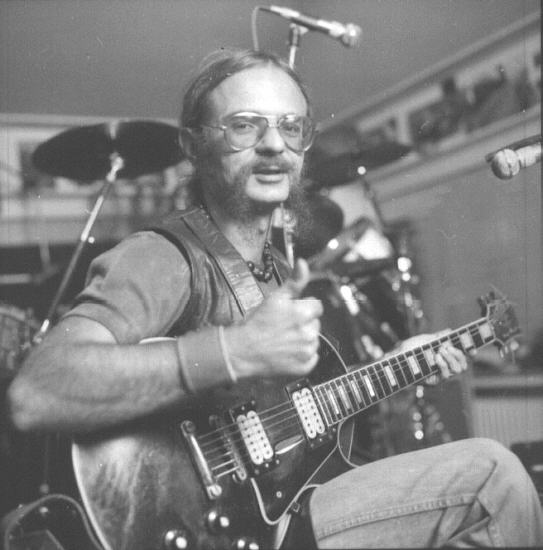 |
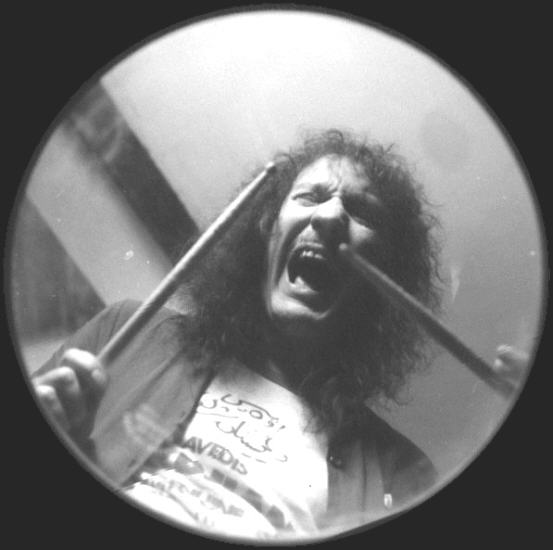 |
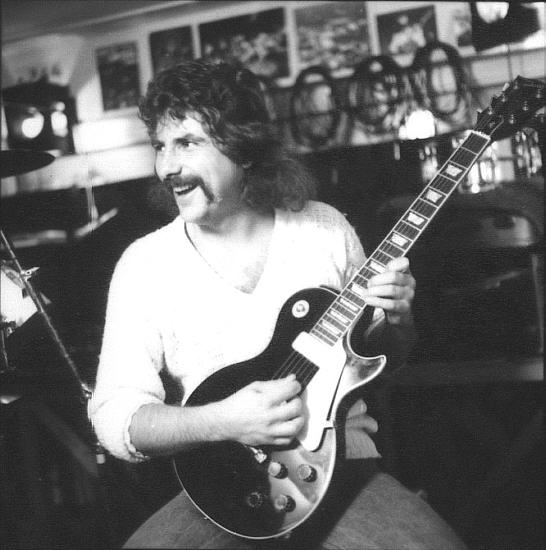 |
 |
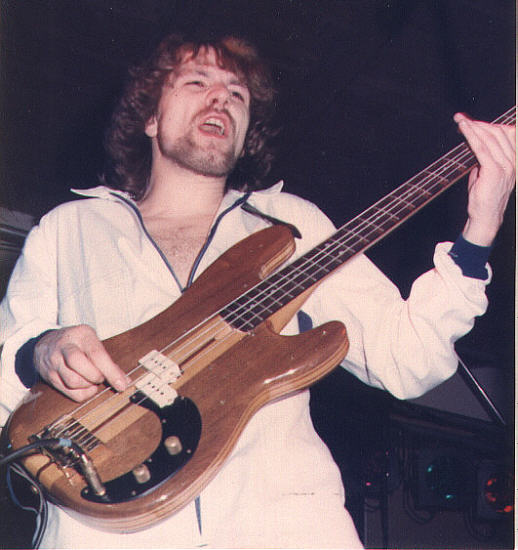 |
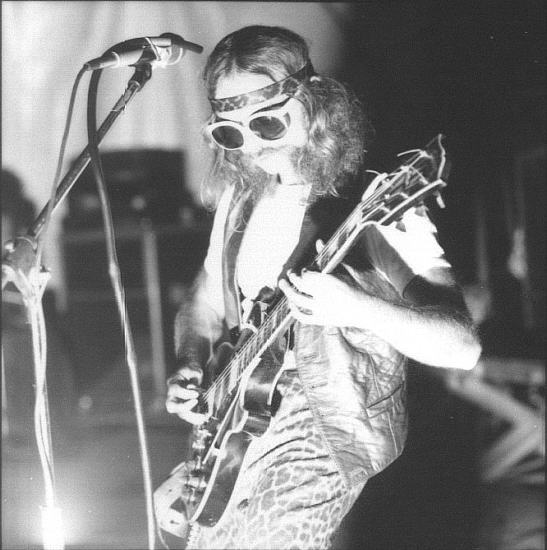 |
 |
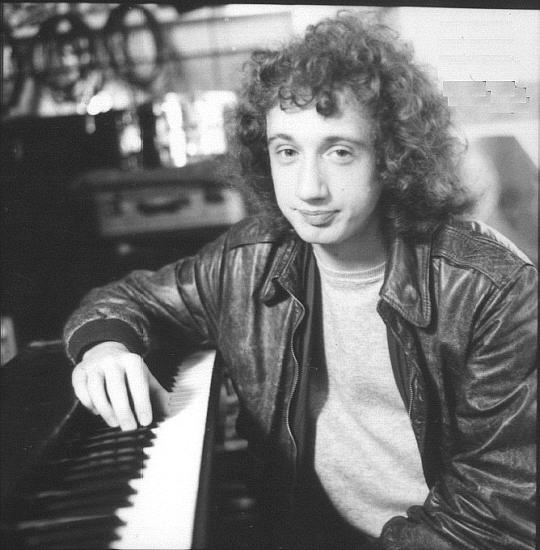 |
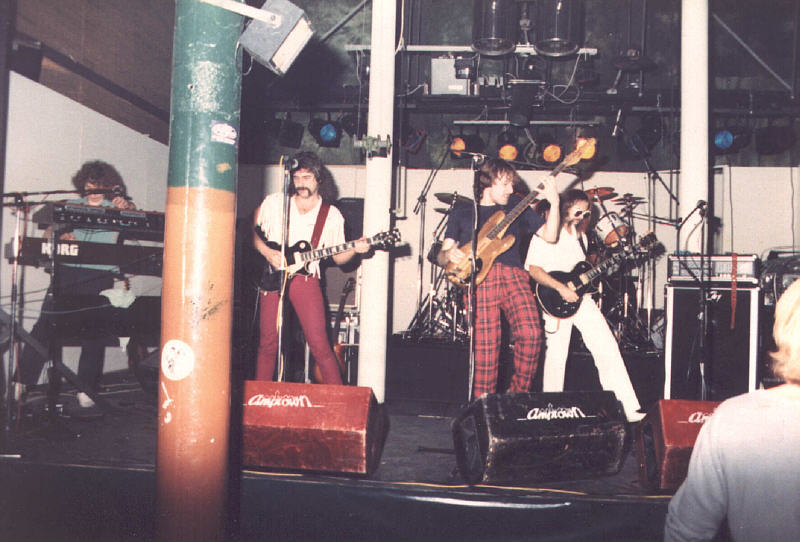 |
 |
At a time when the 'New German Wave' and British techno-pop were dominating, the traditionally oriented rock music of Birth Control was no longer acknowledged and the record shops in Germany only had it on sale for a short time…! For the fans, however, "BÄNG" is and always has been a revelation!
1983
After the "Bäng" LP the line-up changed once again: In place of Ulrich Klein Jörg Becker was taken on.
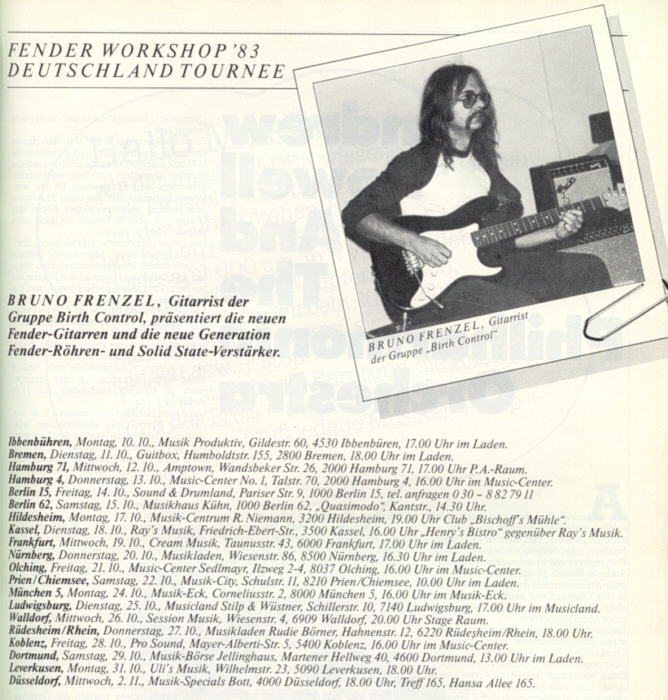 |
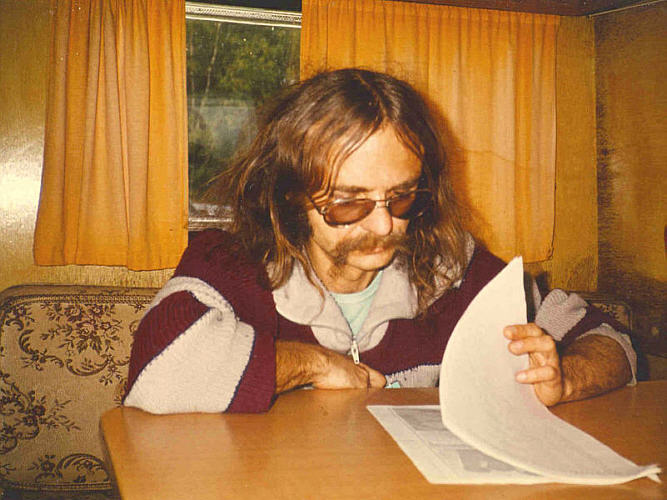 |
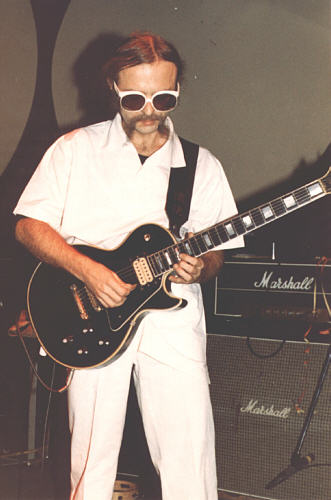 |
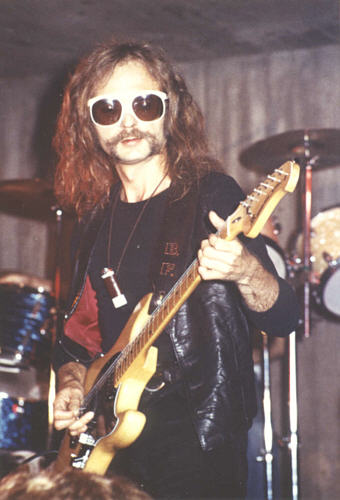 |
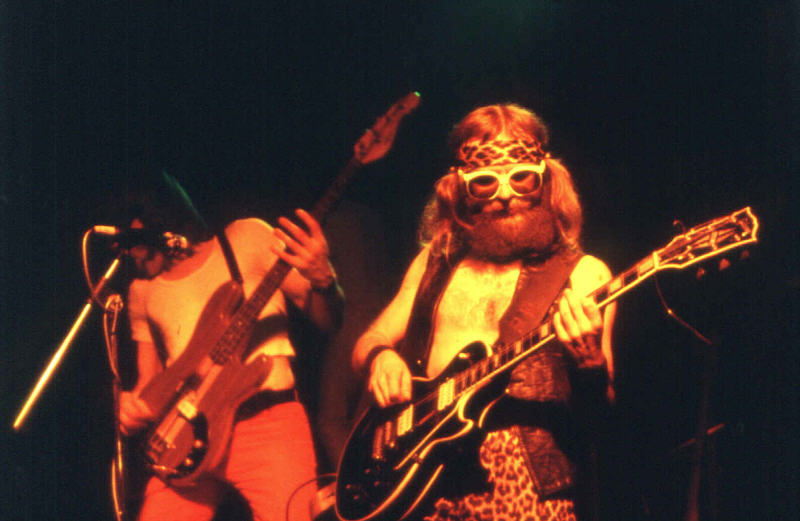 |
On 17th September 1983 a Dutch TV channel recorded a Birth Control concert in Nettetal-Lobberich. One day later, Bruno Frenzel who was terminally ill at that time, was on stage for the last time in Buchholz (near Hamburg). He died on 21.9.1983. With him the German rock scene not only lost one of their most innovative musicians, but also a very likeable guy. Unfortunately, we still haven’t got hold of the recordings from the Dutch TV channel for our archive but here you can still experience Bruno live: Parkhalle Iserlohn – 26th March 1983 – recorded by Dieter "Quark" Hoffstadt !
Nossi's memories:
"In 1975 Bruno suffered an electric shock during a concert in Switzerland, which had serious consequences. The hall wasn’t properly earthed and Bruno got stuck to a microphone stand with his guitar. He was completely electrified. I wanted to pull him away from the microphone and immediately got stuck to him myself. A roadie, fast as lightning, chopped the electricity cable with an axe, otherwise neither of us would have survived."This electric shock resulted in a heart valve damage, which eight years later finally lead to Bruno’s death …
With the LP BÄNG the contract with OHR TODAY expired. New negotiations – also with other companies – came to a sudden end due to Bruno’s death. Even though Nossi first considered a continuation of Birth Control (as Bruno would have wanted it to be), he disbanded the band in early 1984 after careful consideration – which was surely the right decision at that time.